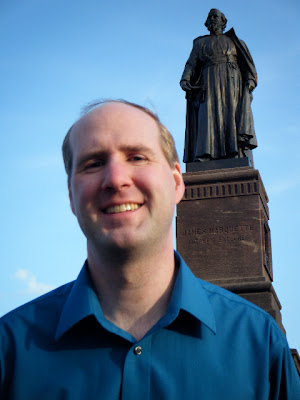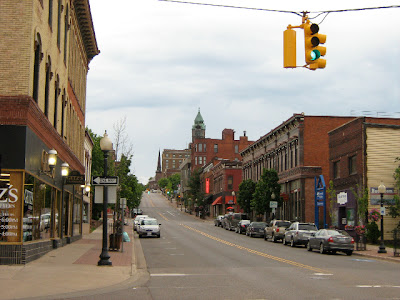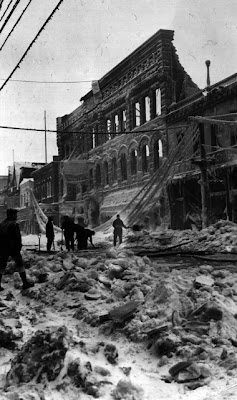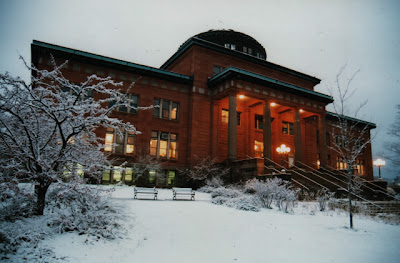One Step at a Time: Write a Guidebook About Your Home Town
Interview With Tyler R. Tichelaar, PhD.
Tyler R. Tichelaar, PhD is the author of the 405-page beautiful, new guidebook, My Marquette. No stranger to penning books, this award-winning author also wrote The Marquette Trilogy as well as Narrow Lives and The Only Thing That Lasts, all historical fiction. Tyler edits books and manuscripts full time and somehow manages to weave in writing all these books! Let’s find out how he does it.

The author, Tyler R. Tichelaar, PhD
You are a 7th generation native of Marquette, Michigan. I cannot think of anyone else I know who has roots in an American town as deep as yours. How do you think this has shaped you as a writer?
I didn’t know I was a seventh generation Marquette resident until I did my family tree when I was twenty-one. I always loved history and the area and wanted to be a writer long before that. I think finding out how deep my roots were in Marquette just made me realize here was a good story to tell, and it made me feel even more connected to Marquette.
I don’t know anyone else who is a 7th generation resident of a town in USA! Did writing your historical novels first help you with your research for My Marquette?
Absolutely. I spent six years writing The Marquette Trilogy, and a good two years of that was mostly doing research, so when I decided to write My Marquette, it was not as difficult as if I had started just writing a history/travel book first.

Downtown Marquette
Wow, six years is a big commitment. How long did it take you to research and write the historical guide?
I thought about writing a sort of memoir about my connection to Marquette in 2005 before my novels were published. Then people read my novels and wanted me to give them tours. The bookstores also told me they wanted a regular non-fiction history of Marquette. I didn’t want to write straight history though, so I used the few drafted pieces of the memoir, made up an outline that was laid out like a walking tour and then wrote a history for each place in Marquette along the walking tour path. Although a person may have to drive in a few instances to places and then get out to walk. I started writing the book in late summer 2009 and finished in spring 2010—six months of serious research and writing a few hours a day, then layout and printing, so the heavy work took about a year total.
It sounds like you are filling a real need with this guidebook. What was the hardest part of writing your book?
Deciding what to include and what to leave out was most challenging. It mainly depended on whether I thought readers would find it interesting, and how to give enough detail to sound informative without boring the reader with too much detail.
How on earth do you verify all those thousands of facts in your book?
I used lots of old books, newspaper clippings, original documents like censuses, visits to gravestones, etc. I would often find sources with errors. A book might say something happened in 1857 and a newspaper clipping might say 1858, so I would spend a lot of time trying to sort out which one was correct. I tried whenever possible to find the original source of the information. That was the most time-consuming and frustrating part of writing the book, but accuracy is vitally important.

Marquette Opera House
The fact-finding process sounds like a lot of fun. That’s so cool that you visited cemeteries and hunted down historical documents. Out of all the historical facts you uncovered about Marquette during your research, what did you find most fascinating?
The people and their stories fascinate me most. I think my favorite part of the book was the section on the historical homes. They were owned by wealthy people, mostly in the mining and lumbering industry. These families all intermarried. In fact, the four Kennedy sisters all married wealthy men and all lived on the same street with their husbands. Their marriages and a few others resulted in nearly everyone in Marquette’s upper class being related by blood or marriage. My interest in genealogy made me find it fascinating to unravel all these layers of relationships. I was also fascinated by how these wealthy people connected the area to other places. Theodore Roosevelt came here because he knew the Shiras family. Louis Kaufman of Marquette funded construction of the Empire State building. And then there were all the immigrants who came here to build better lives. All of their stories were fascinating.
How do you plan to market and sell your book?
I’ll do the usual things like sell it at Amazon, on my website www.MarquetteFiction.com, and promote it on my blog. I’m busy getting it in stores throughout Upper Michigan, and I’ll do some book signings and art and craft shows during the Christmas season. Something new I’m trying is having Reader Views make me a book video trailer.

Marquette Courthouse in Winter
What did you enjoy most about writing this book?
The process helped me discover and recall the past and my own connections to different people and places in Marquette. Many of the people I mention in the book I knew in my childhood and they are now deceased. I wanted to honor them by remembering them, by telling the stories of everyone from ministers to businessmen, from restaurant owners to cleaning ladies. All of these people make up the Marquette I know and love.
Do you have any more books planned for the near future?
Oh yes, I have something like seven more I plan to write, including more novels set in Marquette and other books that include fantasy and historical fiction.
What do you like to do when you are not writing or editing other writers’ books?
I enjoy taking walks in the area, especially along beautiful Lake Superior. I love going to plays and movies. Of course, I read a lot. And I have a lot of wonderful friends and relatives to spend time with.
Do you have any tips for aspiring authors as far as making time for writing, while also working?
Don’t let the potential size of a project overwhelm you. Work on it a little each day. If five or ten minutes are all you have, that’s enough. If you have to write while lying on the couch and watching TV, that’s okay too. If you just write a page or even a paragraph a day, eventually you’ll finish it. The hardest part is getting a rough draft on paper; the revision is important but considerably easier.
What advice would you give to our readers who are thinking about writing local or historical guidebooks?
Find out what is already out there—brochures, maps, older history books. Read them, analyze them. Ask yourself how you can update and improve on them and what you can do that’s original. For example, anyone could have written a history book about the area, but I personalized mine by telling the story of my family over seven generations in the area. Also, collect lots of good photographs, and make sure you have high resolution photographs. People love photographs, and they sell books. Be sure to include historical ones too. Most importantly, believe in your project. Capture the history of the place. Even if you’re writing a guidebook that’s not focused on history, you’re writing about a place in a particular time period—the present—which will be a benefit for future generations to look back on and see what life was like at the time.
Tyler, is there anything else you’d like to share?
I want to thank Wandering Educators for this opportunity. I hope your readers will now know where Marquette, Michigan is on the map and some of them will come to visit. We are considered one of the top distinctive destinations in the United States and one of the most desirable places to live. I’m glad to help give Marquette—the Queen City of the North—a little of the recognition it so richly deserves.
Thank you, Tyler for sharing your expertise with our readers. After I reviewed Crafting the Travel Guidebook on this website, I got an idea about just how much work it takes to write a book like this. I can surely appreciate your effort! I am sure there are many people out there who have thought about writing a book about their town or region. Thanks to your insight, perhaps now they will be ready to give it a try. Good luck with your beautiful book!
Debbie Glade is the Geography Awareness Editor for Wandering Educators
